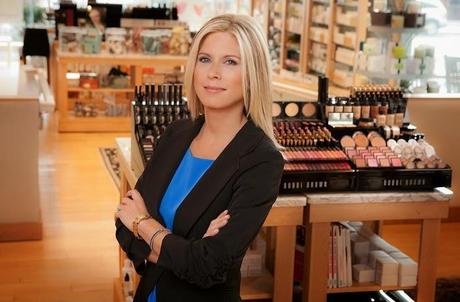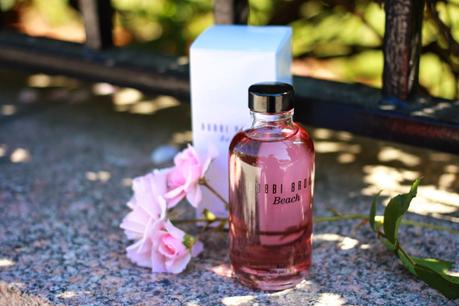 Image c/o Bluemercury
Image c/o BluemercuryRead Part One of the interview to catch up on what Bluemercury Co-founder and CEO Marla Beck reveals about her company's past and future, what beauty products she loves, and how tech will be involved in the company's evolution.
We left off last time hearing from Beck about how experimenting with makeup as a teen eventually lead her to hone in on a routine that works for her.
Did you have a feeling as a teen that you would be involved in beauty?
No, I never thought - No! I always knew I would go into business, but I never thought beauty, although I was always passionate about beauty products, so I linked the two eventually.
What about your degree from Harvard's John F. Kennedy School fo Government, how did that fit in?
I was always a little schizophrenic. When I was in high school, I wanted to do international business, so that's how government looped it. I did a lot of work in economic development - I lived in Indonesia, and worked with the government there, consulting on how to get more clothing manufacturers to export out of the country, which would provide jobs. Now, I'm going back in that direction again, I'm starting to advise people that work in that area but more from an entrepreneurial perspective. Entrepreneurship drives economic development so it's coming back full circle.
Has your background in government affected your company culture?
I apply leadership to the company culture, and that's really about having a warm organization where we are all passionate about the same thing. People spend a lot of time working, and they want it to be a warm experience. I still personally interview every single store manager that joins the company: The store managers is the front line, they really know everything that goes on in the store, and having that relationship is key.
Unlike most retailers, we're really a mom-and-pop business but on a larger scale. We are family. Some of our staff have worked for us for the full fifteen years since we started. And, we have people that leave and come back; They're like "Nowhere else is like here!"
What was the most important lesson that you learned in Business School that you apply to running your business?
First, it's how to make quick decisions. In school, you have to read three or four case studies a night, analyze the problem, and come up with a decision, and you may not have all the information. How to make decisions with the information you have is an important trait. The second thing is how to forge relationships and collaborate - we all need more of that!
Many great entrepreneurs are able to build incredible businesses because they also knew what not to do - was there anything you were taught that you just knew you had to ignore?
In terms of what I had to unlearn - there was a whole strategy when I was there, which is you have to grow big really fast and spend a lot of money to get big. Everyone used to run around saying "GBF, GBF!" (Grow big fast) and the tables have turned - now it's about minimal viable product. You need to create a small company and see if it works, and then grow faster. I believe in a business model where you start a company, you figure it out, and you do a little bit more, a little bit more. But for me, all of these one-size-fits-all strategies for entrepreneurial businesses don't really make sense.
There's now this added layer of bypassing the process of growing organically, through platforms like Kickstarter that have given people instant access to tons of money, and then they spend it all, and they still have commitments and obligations to the funders, and then what? That's it!
Yes! And that's the problem - you don't want to run out of money. Your goal should be to build a great company, it should never be to build something quickly sell it and get out, because you're not in charge of the timeline like that. But if you focus on building something for the long term, good things happen.
Like in these reality shows about flipping houses and making money fast, everyone seems to think that it's all that easy.
And the thing is, someone always gets caught holding the bag.
It's like hot potato.
To me, hot potato is stressful! I'd rather hold hands and do Ring Around the Rosy! That stress of trying to time things is not healthy for people, or the economy.
Speaking of the economy, do you notice that there are trends where the spa and skincare part of your business is doing much better than the retail side, and vice versa?
I think the spa business has more ups and downs, based on the fifteen years that we've been in business. Going to the spa and getting a facial is not seen as a necessity, so during the recession it dipped down, but there are probably three times as many spas now than fifteen years ago. Waxing, and brow styling has always been consistent throughout time. I think that we are going to see another wave of spa trends, this time not from Europe but from Asia. We're starting to look at more treatments, like pulse technology, that are coming from there.
Anti-aging skincare continues to be strong - I think the technology is working really well - and makeup, interestingly, has so many new formulas that have come out in the last year. You're seeing lines like Bobbi Brown and Laura Mercier dump their old formulas and just start over with a new formula. I think there's a lot of innovation that is not completely obvious to the end consumer going on in products. Eyeliner, lipsticks - it's all gotten so good!
It does seem that now, products that are built to last all day, from the time you get up to the time you crawl back into bed!
Yes - Longwearlongwearlongwear!
 Bobbi Brown's Beach Body Oil - or as I like to call it, "Liquid Summer", $33 at Bluemercury. Image by Renata Certo-Ware
Bobbi Brown's Beach Body Oil - or as I like to call it, "Liquid Summer", $33 at Bluemercury. Image by Renata Certo-Ware
